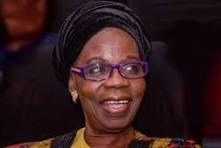Ade Olu
Dr. Doyin Abiola, Nigeria’s first female editor and later Managing Director/Editor-in-Chief of a national daily newspaper, passed away at the age of 82. According to family source, she died on Tuesday, 5 August 2025, after a brief illness.
Widely regarded as a pioneer in Nigerian journalism, Abiola was the wife of Moshood Abiola, the acclaimed winner of the annulled 1993 presidential election. She was one of Africa’s most influential media leaders, a testament to the power of vision, resilience, and innovation.
Her groundbreaking career, from her early days as a reporter to her tenure as Managing Director and Editor-in-Chief of the National Concord, offered invaluable lessons and inspirations for female journalists across generations.
Dr. Abiola’s career was defined by her courage to step into spaces where women had been excluded. At a time when newsroom leadership was an exclusive male preserve, she rose to the pinnacle of editorial and managerial authority in one of Nigeria’s most influential newspapers.
For today’s female journalists, her journey is a reminder that gender should never be a ceiling. It is a call to challenge entrenched norms, demand a seat at the table, and, when necessary, create new tables altogether.
Academic Rigor and Professional Excellence
Armed with a strong academic background, including a doctorate in communications and political science, Dr. Abiola exemplified the value of deep knowledge. She proved that journalism thrives when rooted in thorough research, critical thinking, and mastery of both content and craft.
For female journalists, her example underscores the need for continuous learning—whether through formal education, specialized training, or self-driven skill-building—to stay relevant and authoritative in a rapidly evolving media landscape.
Under her leadership, the National Concord became a platform that blended hard news with bold investigative reporting and human-interest stories that resonated widely. She demonstrated how editorial innovation could shape public discourse and national narratives.
Her career inspires female journalists to embrace creativity—experimenting with formats, exploring new beats, and leveraging digital tools to tell compelling, solution-oriented stories that drive change.
Resilience against adversity
Dr. Abiola’s era was not without political and economic pressures, yet she navigated them with integrity and courage. She showed that leadership in journalism is not only about producing stories but also about defending editorial independence and ethical standards. Journalists both male and female can draw strength from her example, learning to hold the line against censorship, intimidation, or the temptation of compromising values.
Beyond her personal achievements, Dr. Abiola has been a source of inspiration for younger journalists, proving that part of true leadership is lifting others. Female journalists can learn from her commitment to mentorship and her recognition that empowering others amplifies one’s own impact.
Dr. Doyin Abiola’s journey is a blueprint for innovation, drive, and attainment in journalism. She showed that a woman can not only excel in the newsroom but also lead it, shape its voice, and influence the national conversation. For female journalists today, her story is not just history—it is a mirror, a challenge, and a guide to what is possible when ambition meets excellence and courage.





